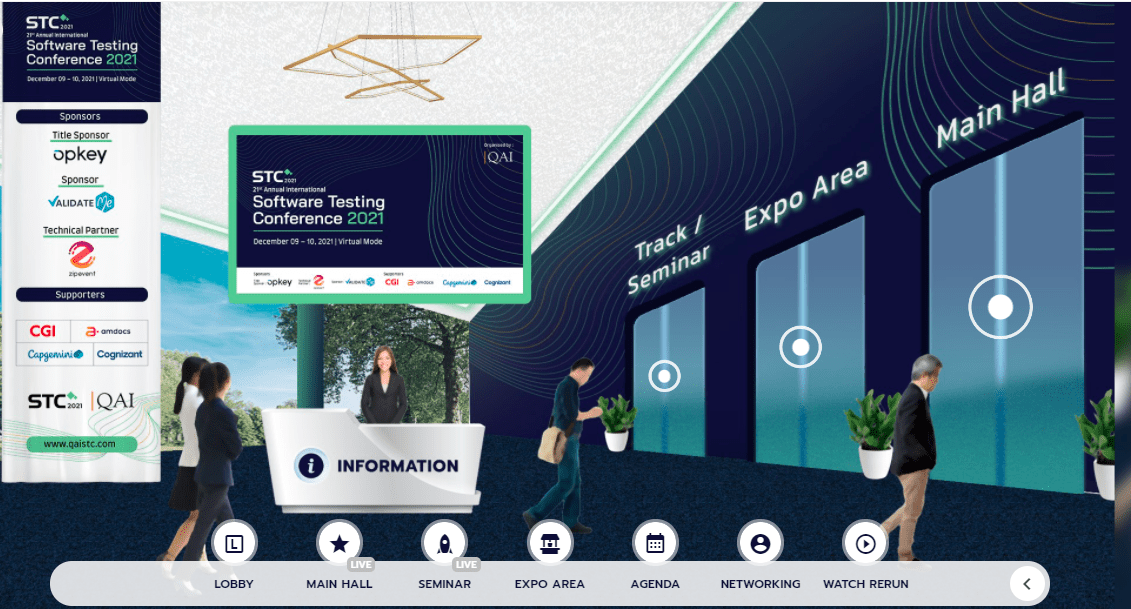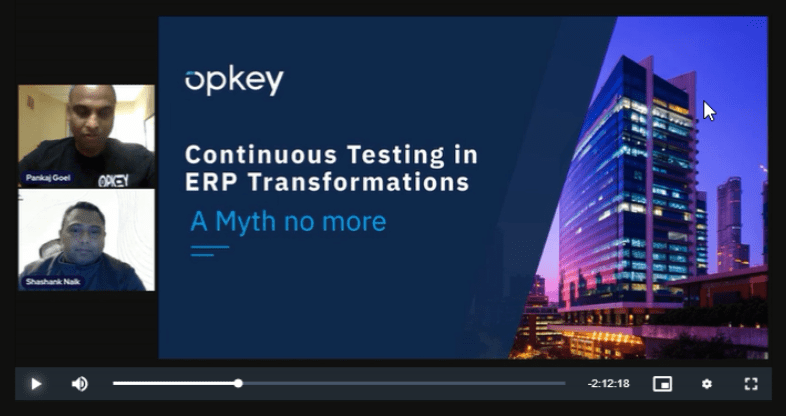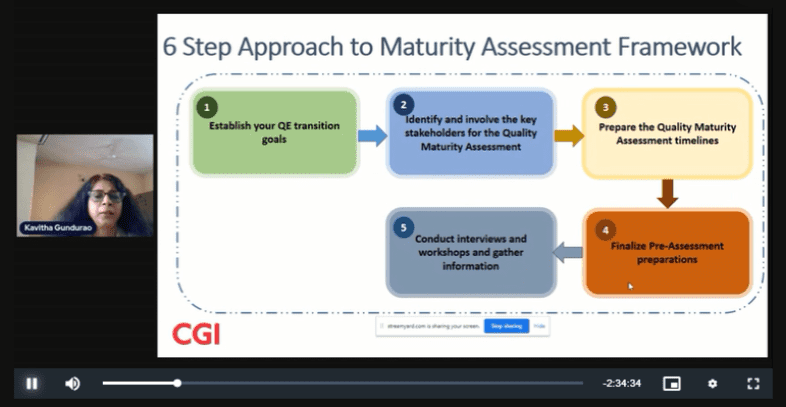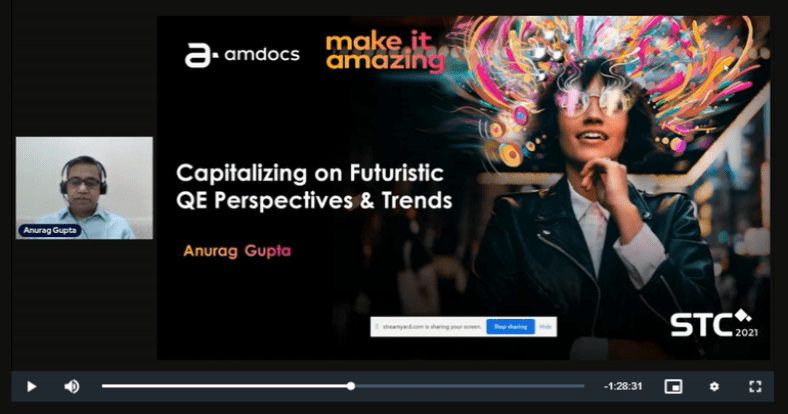Asia’s leading software testing conference, QAI STC 2021 concluded on December 9th & 10th, 2021. The theme of this year’s STC was Continuous Testing @ Scale: Defining the Blueprint for the Future of Testing. The virtual conference was organized systematically and ended on a high note with the aim of educating the audience on the latest trends and practices in software testing. The keynotes delivered by software testing practitioners were extremely informative and the opportunity to understand the present tools and techniques to prepare for a better future.

One of the most lauded and perfectly timed topics was shared by our CEO, “Mr. Pankaj Goel and Mr. Shashank Naik, Advisory Principal (KPMG).” In the keynote, they spoke about the growing need of Continuous Testing in ERP Transformations projects. Why do enterprises need it? How to make it work and how a continuous test automation platform like Opkey can help in the whole transformation journey.

According to a survey conducted with 200+ ERP Managers and App owners, 40% of implementation time is spent on managing changes leading to scope creeps, whereas automation coverage remains the main challenge.
The further discussed why testing challenges for enterprise apps are different than custom apps. The next generation of ERP solutions, such as Oracle Cloud and SAP S/4HANA, offer even more promising capabilities, both functionally and technologically with complex integration, frequent platform updates, legacy migrations, and many more. Continuous testing approach powered by Intelligent test automation can mitigate a lot of those risks with features like Self Configuring Tests, Continual Impact Analysis and Self Healing Tests.
Continuous testing tools like Opkey can automate your testing process with automated Test Design, Test Execution, and Test Management without coding. No technical users are needed. Quickest time to value.
Know your ideal test coverage with opkey’s process discovery
Opkey has taken the guesswork out of the equation by using the principles of process mining and configuration mining. The T-Myne technology mines the transaction logs and configurations which automatically discovers the as-is business processes and creates thousands of autonomous tests in minutes. Highlights deviations and recommendations from optimal tests with its Gap analysis over a glance. Providing a 90% test coverage in days.
How to analyse the Impact due to the system updates
The Real-Time Change Impact Analysis feature gives detailed information about the changes across the configurations, transactions and custom screens. Opkey’s continuous change Impact analysis highlights the critical risk areas and puts them to test.. Autonomous Self-healing capability prepares enterprises for Cloud update adoption readiness by solving major pain points such as automation scripts maintenance. Automatic detections of changed objects and autonomous healing of automation scripts will make the whole QA process effortless while supporting improved productivity and faster go-to-market.
As the theme for STC, this year was based on Continuous testing @Scale, most of the knowledge sharing was on transforming the testing initiatives for efficiency, agility, and innovation to meet the needs of fast-paced digital initiatives. Let’s have an overview of the takeaways from the best keynotes of STC 2021.
Quality Engineering Maturity Assessment Framework (QEMAF)- by Ms. Kavitha Gundurao, CGI

Quality Engineering is a complete mindset of integrating quality into the fabric of software development throughout the lifecycle. Testing has occupied a central place in quality engineering processes and continues to evolve. There is no doubt that methodologies such as Agile, DevOps, and Automation testing are the driving force behind accelerating test cycles and increasing test coverage for modern businesses.
Further, Ms. Kavitha Gundurao talked about the systematic steps of the Quality Engineering Maturity Assessment Framework that includes,
- How to establish your QE transition goals to adapt to the change management across the testing lifecycle.
- Identification and involvement of key stakeholders for quality maturity assessment, as they play a key role in infusing quality at every step of the testing lifecycle.
- Preparing the Quality Maturity Assessment timelines to take a deep look into the current testing practices tools, techniques, and automation adoption methods.
- Finalize pre-assessment preparations customized based on your company’s needs and perform the knowledge acquisition.
- The final steps in the Quality Maturity Assessment that lead to review these results and compare them to industry standards to create a report and clarify where they are on the quality maturity journey.
Capitalizing on Futuristic QE perspectives and Trends-by Mr. Anurag Gupta, AMDOCS

Traditionally, testing only takes place at the end of the release cycle – a cumbersome, expensive, and reactive process that is simply insufficient for the growing expectations of today’s businesses. Mr. Gupta further explains how The DevTestOps approach will combine development, testing, and operations by moving testing both “left” in development and “right” in development operations and complete the loop by injecting the production data intelligence in testing activities. He also describes some of the latest trends that will have a significant impact on the future of testing and, as such, reshape the landscape of quality engineering.
- Leveraging RPA, AI, and ML in software testing to create and automate test cases, resulting in better test coverage and efficient test automation implementation.
- Low-Code / No-code-based scriptless test automation tools have provided organizations with test automation solutions that do not require writing code, helping the business focus on validating business logic while simplifying the human effort required to automate test cases.
- DevTestOps or QAOps is a combination of DevOps and continuous testing that has helped companies enter the market with new functionality much faster than before and with more confidence using sprint automation.
Conclusion
The virtual annual QAI STC 2021 conference proved to be very productive and informative on emerging technologies and tools. Built on the theme of Continuous Testing @ Scale, the technocrats shared their ideas, and experiences to explore challenges and suggest techniques and innovations to overcome common testing challenges.






